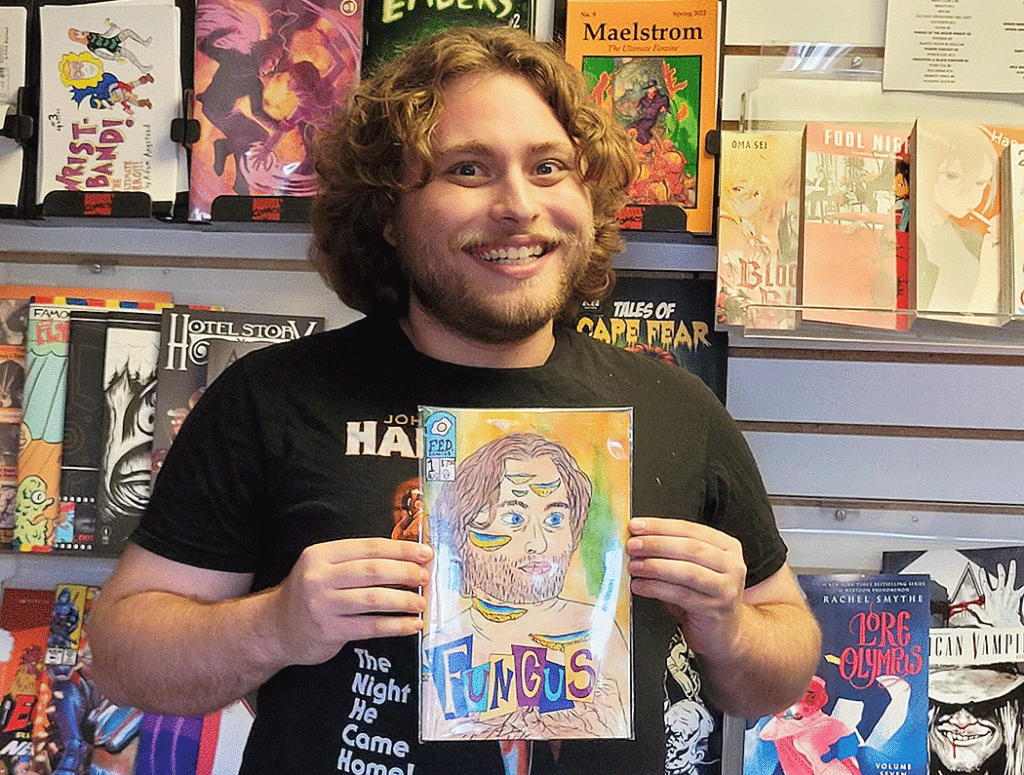
Back in August, I walked into Daydreams Comics in Iowa City on a Wednesday morning (any regular patron of comic shops will tell you that Wednesday is new comic book day) to pick up my weekly stash of super heroics and the like. In short order, it became apparent that this was a special day for one young man in the store. Jackson Palmer was there with copies of the first issue of his new comic book, Fungus. I nabbed one right away and asked Palmer to sign it for me. Mine was, I believe, the first copy sold and signed.
It was an impulse buy, to be sure, but it turns out that the impulse was a good one. Palmer’s book includes, as he writes in the introduction, “a pretty dang wide variety of comics rendered in a few different mediums.”
Fungus comes with a separate mini-comic titled “Death of a Gnome.” The main book opens with “The Ballad of Cowboy Pete,” which Palmer created using MS Paint. The next pages are filled with bare-bones three-panel comics. That’s followed by a political piece centered on Ron DeSantis. The anthology wraps up with the first chapter of “Canned Snakes,” which is ambitious in both form and narrative and which I’m looking forward to exploring in subsequent issues.
A few weeks later, I had the opportunity to talk with Palmer about his work, his influences, and his aspirations. We met in the office at Daydreams because, in addition to being a comics creator, he is part of the store’s staff.
“Comics are a medium that can do things no other medium can do,” he told me as he described his journey from Meridian, Mississippi, to the Mississippi School of the Arts, to the University of Iowa to study in the undergraduate creative writing program.
Palmer came to the realization that comics offered endless opportunities for expression after encountering Bernie Krigstein’s work Master Race from 1955. A series of panels depicting a man falling from a subway platform as a train rushes in helped Palmer see the depth of possibility to be found in comics.
Krigstein was just one of many influences Palmer mentioned during our conversation. He called out Steve Ditko and Stan Lee’s Spider-Man, Jack Kirby’s collage work in seminal issues of Fantastic Four (which had a particular influence on “Canned Snakes”), Sam Keith (creator of The Maxx and Zero Girl), and the comic sensibilities of The Simpsons and King of the Hill.
Fungus is a self-published effort—“It was an investment,” Palmer told me—and it has a DIY aesthetic. Perhaps Palmer’s most impressive feat in the pages of Fungus is to make the limitations he faced into assets rather than impediments. The book feels wholly intentional rather than a “best I could do in the circumstances” effort.
“I had a lot of ideas that I wanted to bring into fruition,” Palmer said. “I figured it would be a cool way to get a lot of ideas out and expressed with different styles and doing whatever I really want to.”
Palmer has a very grounded—arguably very healthy—idea of what success as a comics artist means to him. “Success for me is completing the comic and just being happy with the quality of it. . . . [Success] is feeling like I’ve done something unique within the medium—something I haven’t seen others do.”
He’d like to inspire others to try their hand at creating new art. “If I could convince anyone else to try to make a comic, that would very much be a success.”
To get your own copy of Fungus, contact Daydreams Comics (daydreamscomics@yahoo.com or (319) 354-6632, or keep your eyes peeled at your local comic shop as Palmer seeks to expand distribution of his work.
